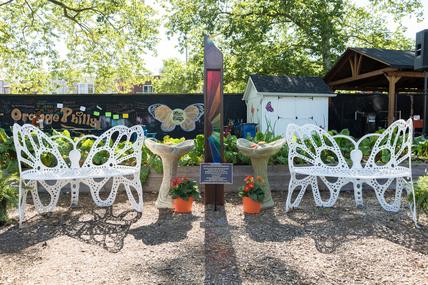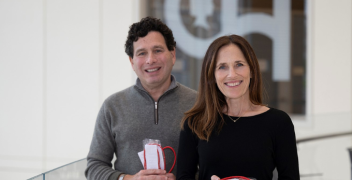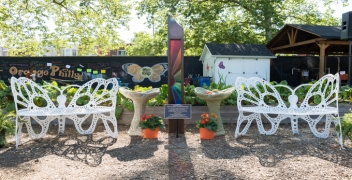Gun Safety Program at CHOP
The prevalence of guns in the U.S. is staggering, particularly when considering health and safety implications for children and families – firearms are the leading cause of death for children and teens ages 1-19 and approximately 4.6 million children and teens live in a home with a loaded, unlocked gun. Research has shown that three out of four kids ages 5–14 know where guns are kept in the home.
To ensure optimal safety for children who live or spend time in homes with guns, experts at Children’s Hospital of Philadelphia (CHOP) have integrated firearm safety counseling and resource distribution into clinical care at a range of care locations throughout CHOP. This initiative supports and encourages healthcare providers to have nonjudgmental conversations with families about guns and, if appropriate, offer education and gun safety devices at no cost.
An Evidence-based Approach
CHOP’s approach is research-driven; prior studies in both pediatric practices and community settings have shown that providing firearm safety counseling combined with a safe storage device improves safe storage practices within the home, as opposed to providing safety counseling alone.
CHOP-involved research has sought out both provider and caregiver perspectives; a study co-authored by CHOP’s Center for Violence Prevention co-director and emergency medicine physician Joel Fein, MD, MPH assessed the needs of stakeholders who would be involved in implementing an evidence-based approach to firearm safety promotion in pediatric primary care settings. The study revealed firearm safety promotion is a health system priority, and identified important facilitators and barriers that have informed program design. Ongoing implementation surveys continue to demonstrate high levels of acceptability among healthcare providers across a range of inpatient and ambulatory care settings.
Surveys and qualitative interviews among families receiving care in the Emergency Department and Pediatric Intensive Care Unit also demonstrate widespread acceptability of firearm safety counseling in the healthcare setting. A key suggestion among children’s caregivers has been to make the safety device distribution universal – meaning offering gun locking devices and safe storage education to all families, regardless of disclosure of firearms in the home. Universal offering is now a primary component of this initiative.
CHOP's gun safety tips fact sheet is available for download in English, Spanish, Arabic, French, Chinese (Simplified), and Portuguese (Brazil).
Watch a video from the Philadelphia Sheriff's Department demonstrating how to use gun locks and lock boxes. The video is also available in Spanish, Arabic, French, Chinese (Simplified), and Portuguese (Brazil). Access all videos on our YouTube channel.
Current Work
Gun safety device distribution is currently underway across a range of care settings at CHOP. These include two Emergency Departments, five primary care practices, all ambulatory mental health practices, the recently opened Behavioral Health and Crises Center, several subspecialty practices, Security hubs and two inpatient units. All families, regardless of firearm ownership, are offered free gun cable locks that have been supplied by CHOP’s Center for Violence Prevention, counseling regarding best practices for safe firearm storage, resources for asking about firearms in other places children spend time, and an educational handout.
Ongoing expansion of this initiative is underway, including dissemination to all 31 of CHOP’s primary care practices, and implementation in the inpatient setting through the Uniting Pediatric Nurses as Leaders in Firearm Injury Prevention (UPLIFT) trial. This trial, made possible through a 5-year grant from the National Institute of Nursing Research, will adapt an evidence-based safe firearm storage intervention for the inpatient setting through nurse-led delivery of free gun locking devices and safe storage education.
Ongoing evaluation of our efforts are critical. Caregivers in a subset of settings are currently being surveyed about their intent to use the lock and/or change their firearm safety practices, and a follow-up study exploring changes in safe storage practices is underway. Heath care providers are also asked to give feedback on the initiative overall, including both the education and device delivery components. Long term goals of this collaborative project include reducing the risk of pediatric firearm injury and mortality through integration of firearm safety counseling and locking device distribution into routine pediatric care, and developing a model that can be used across a variety of pediatric healthcare settings.
- Completed Research Projects
Firearm Violence and Health in Policymaker Discourse: A Mixed-Methods Social Media Analysis
Since 2019, firearm violence has remained the leading cause of death for U.S. children and adolescents aged 1-19. Understanding how state policymakers discuss firearm violence can inform more effective public health strategies. This study examines how Pennsylvania state legislators discuss firearms and firearm violence on social media and assesses the extent to which their messaging aligns with public health perspectives. Researchers conducted a two-phase mixed methods analysis of X posts by Pennsylvania state legislators from 2017 to 2022, sampling 1,491 original posts authored by 152 unique legislators surrounding the Tree of Life Synagogue mass shooting in Pittsburgh. Results showed that posts using advocacy frames were five times more likely to mention policy, whereas posts referencing mass shootings or emotional appeals—topics prioritized by Pennsylvania legislators—were significantly less likely to mention policy. Health and public health framing was rare, but shifted focus to suicide, mental health, and physical consequences while reducing partisan blame. These findings reveal an opportunity to support policymakers with health-informed messaging strategies to promote actionable firearm violence prevention policies.
This study by CVP researchers is the first to fully assess the impact of video-based education on the firearm secure storage behaviors of caregivers for pediatric emergency department (ED) patients. By integrating video education with the provision of free gun cable locks, the study sought to influence caregivers' practices regarding firearm safety, particularly inquiring about firearm presence in homes their children visit. Out of 307 participants, 39 reported having a firearm present within their home, 89.7% of these being handguns. Secure storage usage increased significantly for handguns, with 88.6% of firearm-accessible participants utilizing a secure storage device at two weeks and subsequent rates of secure storage device continuing to remain stable at 2 months after the ED visit. In addition, after the video-based education the intention to inquire about firearms in other homes rose from 34.5% to 85.3% and was sustained at two-week follow-up. This research reinforces the effectiveness of an evidence-based approach focused on safe storage counseling.
Read a CHOP news brief about the study.
Addressing unsafe firearm storage is essential to preventing suicide and unintentional firearm injury. For patients presenting to CHOP's pediatric emergency department (ED) with behavioral health (BH) needs, researchers implemented a standardized approach to screening for exposure to unsafely stored firearms and offering firearm storage devices and educational resources to the families of patients presenting with BH concerns. Using quality improvement methodology, researchers identified electronic medical record (EMR) documentation and availability of firearm safety resources (gun locks and firearm safety handouts) as areas for improvement. At the completion of the QI process, 85% of the patients who identified they had unsafely stored firearms at home received safety resources. The study found that incorporating firearm safety questions into the EMR and maintaining a supply of firearm safety resources in the ED is an effective and sustainable approach to enhancing firearm safety for high-risk BH patients.
Read a press release about the study.
Neighborhood Firearm Violence, Psychosocial Risks, and Youth Firearm Perception
In collaboration with the University of Pennsylvania School of Nursing, CVP researchers examined 23,334 emergency department visits between 2013 and 2024 by teenagers aged 14-18 who underwent behavioral health screening. Findings document a substantial link between exposure to neighborhood firearm violence, participation in fighting, and an adolescent's perceived ability to acquire a firearm outside their homes. This study illustrates that emergency departments can gather information that can lead to crucial intervention points for firearm injury in youth. The authors recommend that EDs universally screen not only for firearm possession but also for perceived firearm access and past fighting behavior.
Read a CHOP news brief about the studyEvolution of Firearm Mortality as the Leading Cause of Death in the US Pediatric Population
The comprehensive analysis spanning from 2004 to 2023 provides new state-level insight into the significant shift in the leading cause of death among children and adolescents ages 1-19 years in the United States from motor vehicle collisions (MVCs) to firearms. While this pivotal change was initially observed at the national level in 2019, this study reveals how individual states began to “flip” to firearm injury as the leading cause of death for children as early as 2004. By 2023, firearm deaths for this age group outnumbered non-firearm deaths in 24 states and including more than 50% of our young population. The study raises a crucial alarm: while motor vehicle fatalities declined by nearly half, firearm-related deaths surged by more than 50%. This shift not only reflects changing trends but calls for a unified public health response, including state-specific policies that have demonstrated effectiveness in protecting children.
Child Opportunity Index and Access to Firearms Among Adolescents and Young Adults
This retrospective cohort study of 54,396 adolescents and young adults (aged 13-21 years) who had primary care visits at Children's Hospital of Philadelphia during 2022 investigated the association between Child Opportunity Index (COI) and firearm access. A total of 13.9% of patients reported in-home access to firearms, and 1.3% reported outside-home access to firearms. Compared to those in very low COI neighborhoods, patients in moderate, high, and very high quintiles had higher odds of in-home access and lower odds of outside-home access. Results may suggest that evidence-based secure firearm storage counseling and locking device distribution could be more impactful in COI areas with higher in-home access; conversely, community-engaged programming or neighborhood-level interventions such as abandoned home remediation may be more appropriate in lower COI neighborhoods. Further research is needed to assess the relationship between COI and firearm access, as well as how best to target interventions to reduce adolescent and young adult firearm injury.
Counseling on Gun Safety In The Home
Learn more about counseling on gun safety in the home.
Philadelphia Gun Violence Victims Memorial at CHOP
In 2022, CVP partnered with Moms Demand Action – Philadelphia Region to open the Philadelphia Gun Violence Victims Memorial, a community space at The Garden at Karabots where gun violence survivors – family, friends, and community members – can visit and reflect. One of the first spaces of its kind in our city, the space is dedicated to honor those who have lost their lives to gun violence in Philadelphia. In addition to Moms Demand Action, the memorial space was created in conjunction with gun violence prevention groups National Homicide Justice Alliance, Mothers in Charge, EMIR Healing Center, and D.I.V.A.S. Ministry.
Hours
The Memorial and Garden are open to the public during Karabots Pediatric Care Center operating hours:
Sunday: Closed
Monday: 8:30am-7:00pm
Tuesday: 8:30am-7:00pm
Wednesday: 8:30am-7:00pm
Thursday: 8:30am-7:00pm
Friday: 8:30am-5:00pm
Saturday: 9:00am-2:00pm
Location
The Garden at Karabots Pediatric Care Center
4865 Market Street
Philadelphia, PA
Read a WHYY article about the opening of the Memorial.
View a recording of the opening ceremony.










